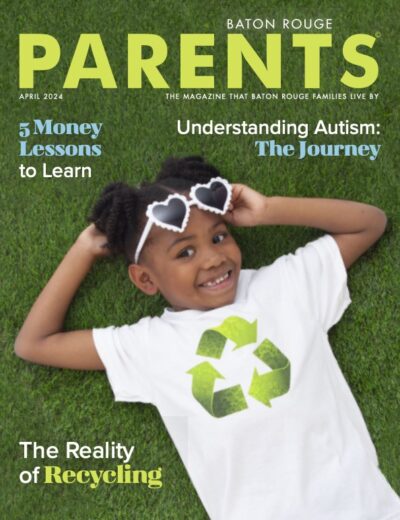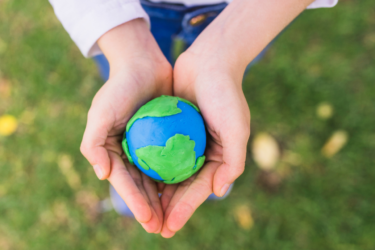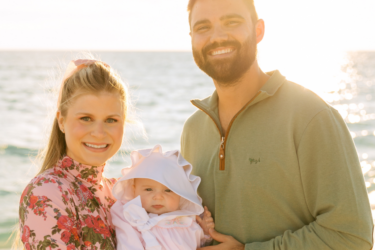
It’s Hot, Baby! Keeping Little Ones Safe in the Heat
Louisiana summers offer a unique sort of heat. And when it comes to babies, it can be downright dangerous. According to the Centers for Disease Control (CDC), excessive heat poses the greatest danger to infants and children up to four years old.
It does not take long for a little one to become distressed in the sizzling sun. Infants do not have the means to alert parents and caregivers when they are thirsty or feeling woozy.
Prevention is the best approach to keeping your kid healthy, happy and hopping through the beautiful summer months.
Preventing Hazardous Dehydration
The thing about monitoring an infant for any reason is understanding what the red flags are. For example, babies do not sweat like adults sweat. The little people are not yet done developing and have fewer sweat glands.
Dr. Mallory Allen, a pediatrician with The Baton Rouge Clinic, advises this when it comes to hydration: “A quick rule of thumb for water intake is that a child needs an 8oz glass of water for every year of age. So, a one year old needs about 8oz of water daily, a two year old needs two 8oz glasses daily, and so forth up to the recommended eight glasses daily for older children and adults.”
Dr. Allen recommends that infants as young as six months can be given water, but if they are younger, it is a good idea to consult with your child’s pediatrician.
Sizzling Sun
Dehydration is not the only factor that makes the summer dangerous for babies. While the sun provides a variety of benefits, they must be weighed against the dangers the sun can cause.
The first rule is one that people of all ages need to remember, sunscreen. According to Dr. Allen, “All children ages six months and older should wear sunscreen when outside and reapply every two hours or after getting wet. Broad-spectrum mineral sunscreens (that protect against both UVA and UVB light) are recommended for children. If a baby is less than six months, it is best for them to avoid direct sunlight and keep them in the shade.”
Another helpful tip is to try not to schedule outdoor activities for your family around the hottest part of the day.
Typically, the sun’s rays are the riskiest for everyone between 10 a.m. and 4 p.m. If outside time is unavoidable, lightweight clothes, hats and sunglasses are your best bet to keep them safe.
Babies are particularly susceptible to getting sunburns. It is more than just uncomfortable for them. Their undeveloped temperature regulating system can become even more suppressed.
Tricks of the Parent Trade
The older a child gets, the more likely they will want to play outside, as they should want to! However, what this means for parents is that they have to adapt quickly as an infant becomes a toddler, and a toddler becomes a child in the snap of a finger.
Every summer brings new challenges and dangers, but we all learn from one another. Chasing an active four year old around has taught one mother precisely what helps with the heat.
Rhonda Ravain-Mire has learned what works best for her son, Colton. She explains, “We definitely keep him hydrated with juice that’s water base. Not a sugar base. We try not to go out during the hottest part of the day. We also take breaks, and we will come in throughout the day to cool down. And, popsicles!”
Pediatricians, parents, and kids can agree on the popsicle solution. What little person doesn’t enjoy a flavored treat, even on a not-so-hot day? It is these types of tips and hints that parents share with one another to get through the hottest of days without creating a stir-crazy kid.
Car Safety
Too often, there are tragedies of little ones being left in cars on a hot, summer day. The best rule to follow is to never leave a child unattended in a vehicle, whether it is summer or not. The temperature in a car, even with the windows cracked, can rise 20 degrees within the first 10 minutes. That’s entirely too hot for anyone. Be sure to bring your babies with you and always check the backseat before getting out, even if you’re not on drop-off duty.
Another hazard that is sometimes overlooked is the seat belt buckle. The reflective metal heats up in the sun and will burn a baby’s skin.
Keeping a two year old happy is not always easy, but Zakah Shawver knows how to keep her daughter, Magnolia, safe and happy while on the road, “When we travel in the car, I make sure to keep air circulating at all times. The windows on the back of my vehicle are tinted. I always have the car cooled off before getting in.” She goes on to mention, “Magnolia’s favorite thing is having the windows down. So when we cruise around town, the windows are down, and the music is up.”
The most important thing is to always keep a close eye on your little one. If he or she demonstrates any symptoms of heat-related illness or dehydration, including headache, clammy skin, irritability, and nausea, get him or her to a cool location and rehydrate. It is advised by Dr. Allen that if a child shows no improvement in 20-30 minutes, contact your pediatrician. It is better to be safe than sorry when dealing with Louisiana heat. ■





